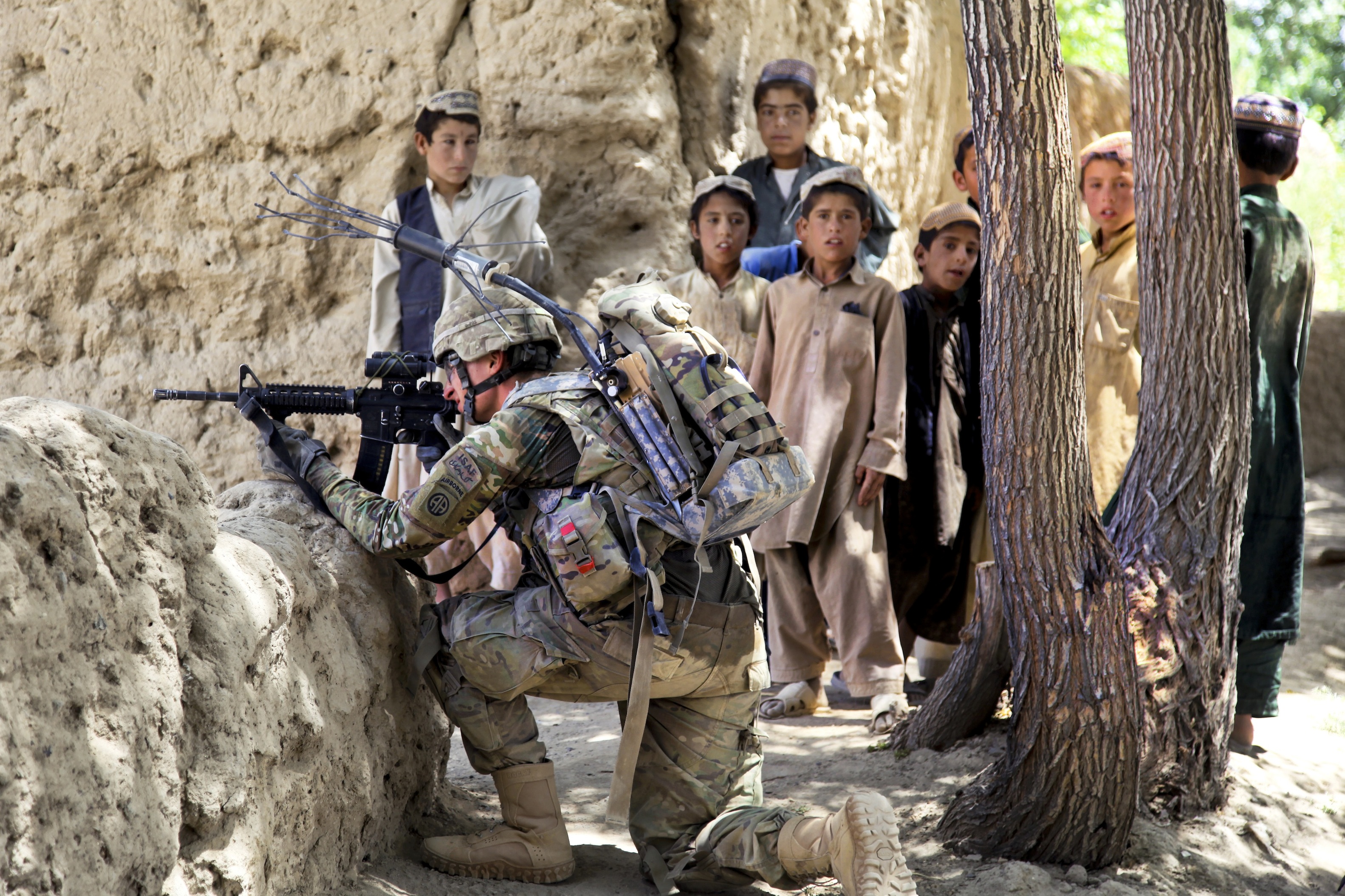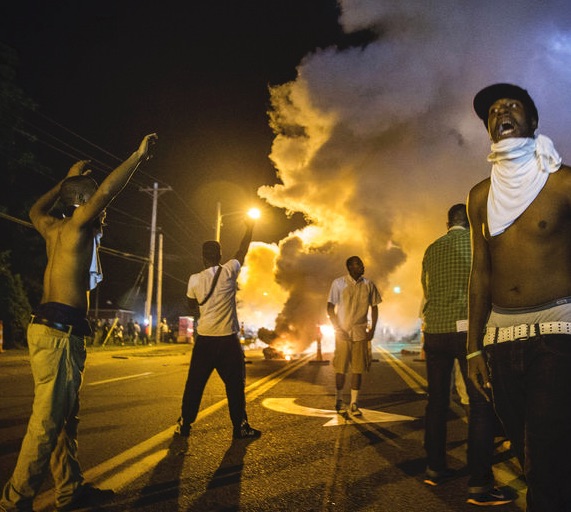
There’s an eerie resonance between the domestic ruins of a now faded American industrial empire—dead malls, empty factories, derelict bridges, ghost towns—and the far-flung archipelago of military bases that act as the antenna of whatever power we have left to project. Both are symptoms of a nation that has lost the thread. The sad fading lights of a denouement. One of those bases on the far eastern frontier of Syria was known among the Special Forces operators who occupied it as Castle Black, a reference to the fictional stronghold in Game of Thrones meant to be Westeros’s last line of defense against the half-forgotten ancient evils from the icy north. After the American Castle Black was hastily discarded, it might as well have been the site of an abandoned strip mall, littered as it was with all the cheap bric-a-brac of our dime store culture.
"The American military is an unaccountable bureaucratic organization locked in a cycle of metastasized growth, lacking anything beyond solipsistic reasoning for its own existence."
“It appears as though the U.S. servicemen fled in their armored vehicles,” said a reporter for RT’s Arabic service. But the evidence of American occupation remained: fridges full of Coca-Cola, animal crackers, a can of Pringles, a football, drawings of dicks on whiteboards, a copy of The Girl with the Dragon Tattoo. All this shit is the Kilroy of our generation. Moronic garbage littered across the globe, evidence attesting simultaneously to both our technological prowess and degraded national spirit. We can’t win a war, but we can plant footballs and Pringles in the desert, like deranged Johnny Appleseeds.
In sheer material terms, the American military is awe-inspiring. Everyone knows that we spend more on our military than any other country does. More, in fact, than the next ten countries combined. That cash is spent in part on vast fleets of machines which consume more fuel than most countries. According to the CIA World Factbook, the Department of Defense burns through over twelve million gallons of fuel a day. We have nearly three thousand tanks, ten aircraft carriers, and 1.3 million active duty troops. The cultural impact of the military, even post-Cold War, shouldn’t be underestimated either. The military has its fingerprints on everything from the internet to movies to video games. And lest we forget, there’s nuclear energy itself, the Pentagon’s Holy of Holies silently waiting to blossom as a quasi-divine second sun then decay through generations of half-lives.
All this and yet we haven’t won a war since the 1940’s. Not a real war, at least. One where we are challenged, adjust to the challenges, and then achieve a clearly defined victory. It’s as if the American military, in its current incarnation, isn’t really designed to do that. But if it isn’t meant to win wars, then what is it for? The situation in many ways echoes the final collapse of the Athenians, when the social elite were defeated by the Macedonians off the island of Amorgos without really putting up much of a fight. “When they surrendered to the Macedonians,” writes historian John Hale, “the Athenians had more ships and a better-equipped naval base than ever before. Philo’s arsenal was still brand-new. Some mysterious essence, however, had vanished.”
It is too simple to say that this “mysterious essence,”—call it thumos or national cohesion or the warrior spirit—is directly responsible for military victory in a one-for-one exchange. But what the Athenians lost, and what we have also lost ourselves, is necessary for achieving anything like a victory. Carl von Clausewitz’s famous phrase “the fog of war” is often misunderstood to mean that in war no choice is unambiguous, that the path forward is more likely than not something you have to muddle your way through. It means all that, but much more as well. It also means that there are second-order events which happen far down the chain of causation. A kind of military version of the butterfly effect. And because of this highly-structured chaos, a successful military spends most of its time adjusting to the changes rather than insisting on the coherence of an overly-specific reality.
For war isn’t chamber music; it’s improvisational jazz. The only mistake you can make is in not adjusting. But that isn’t easy to do. It requires complete honesty, first and foremost, with yourself about what’s actually happening. And it requires a supreme confidence and resolve. These are all part of the mysterious essence which was absent in the Athenian capitulation to the Macedonians. It was absent for us in Vietnam. And Iraq. And Afghanistan. It wasn’t even so much that we couldn’t win as that we didn’t even know what winning meant anymore. And we certainly didn’t know how to be honest with ourselves about that loss of perspective.
In The Washington Post’s recently published Afghanistan Papers, which are being compared to the Vietnam-era Pentagon Papers, that self-deception is on full display. The Post describes its find as:
A confidential trove of government documents obtained by The Washington Post reveals that senior U.S. officials failed to tell the truth about the war in Afghanistan throughout the 18-year campaign, making rosy pronouncements they knew to be false and hiding unmistakable evidence the war had become unwinnable.
It is an accurate description, but it overemphasizes how the public was misled. In fact, average Americans read the writing on the wall over a decade ago. We’ve known for a long time that our “warfighting strategies were fatally flawed,” and that “Washington wasted enormous sums of money trying to remake Afghanistan into a modern nation.” Only a career bureaucrat would believe, as the saying I heard when I was in the Army goes, that if you kick a Pashtun hard enough, he’ll become an Australian. American citizens largely understand, and have for quite some time, that the government “botched attempts to curtail runaway corruption, build a competent Afghan army and police force, and put a dent in Afghanistan’s thriving opium trade.” What the Afghanistan Papers reveal isn’t so much something that was hidden from the American public, but something that the American government, and specifically the Pentagon, hid from itself while average Americans stood on the sidelines, either powerless to do anything about it or apathetic towards the situation.
This self-deception isn’t new, and it comes in large part out of a misunderstanding of the messiness of combat itself. To quote another misunderstood saying of Clausewitz, war might be “the continuation of politics by other means,” but if your politics consist of a fanatical obsession with being able to fundamentally alter reality by fiat (read: changing culture or human nature itself through budgetary spending and policy proposal), then those political illusions are going to infect your military operations. You cannot win a war if you’ve lied to yourself about human nature.
The American hubris that confuses interests and values, downplays deep cultural differences, and clings fanatically to the hope that military operations can almost always create a clean and fog-free political result was on full display in our invasion of Iraq. “All of the traditions,” Michael MacDonald writes in his book Overreach: Delusions of Regime Change in Iraq, “that called for regime change blended American power and values; all considered American values transportable; all equated threats to American values with threats to national security; and all assumed that American power was welcome in Iraq because it materialized liberal values.” MacDonald means the Washington hawk-consensus of neoconservative-liberal hawk-neoliberal. This ideological cul-de-sac, that everyone in the world is really an American liberal in colorful ethnic costume and technocratic market-economies are inevitable, is a synecdoche for the closed loop of our military logic. We take the impossible for the inevitable and call ourselves the agents of history. We don’t make mistakes; it’s just that the world hasn’t yet been bent far enough along the arc of history towards justice. As MacDonald explains:
The great irony of the neoconservative war in Iraq was that winning would have promoted neoliberal ends. . . . [N]eoliberals fretted that the war might take too long or cost too much in actual or in opportunity costs, and they had powerful reasons for deeming the war to be unnecessary, given that history and human psychology were on their side anyway. But their strongest reason for opposing the war—that it was redundant—testifies to neoliberal certainty. Taking for granted that at the end of the day the war would produce a market economy, a market society, and a global sensibility, neoliberals spoke little about ends precisely because they were self-evident. The future is theirs.
And so our military operations are warped by ideology. But they also simultaneously operate according to the dictates of another logic, less hubristic and more coldly materialistic: The American military, just as much as enacting demented policy, exists for the sake of sheer growth itself. It’s not much of a mystery how, even when the budgets of the State Department or the Environmental Protection Agency get slashed, the federal government continues to grow. The military steps in to take over the responsibilities that once belonged to other agencies.
Only, the job of the military should be to efficiently kill the enemy, not to perform diplomacy or environmental oversight, or any of the other myriad distractions that it’s now tasked with. Rosa Brooks, in How Everything Became War and the Military Became Everything, writes that bipartisan support for oddball military solutionism only ratcheted up after 9/11. “[A]s budget cuts cripple civilian agencies and programs,” she explains, “they lose their ability to perform as they once did, so we look to the military to pick up the slack. . . . This requires still higher military budgets, which continues the devastating cycle.” It also distracts the military from its primary purpose.
On paper, the vast size of the military might seem to be an advantage, but does being a byzantine bureaucracy actually offer any tactical advantage? Unfortunately, the fact of being such a sclerotic institution precludes the Pentagon from asking the very question. Try reading the Joint Operating Environment 2035, for instance, a document which historian and strategist Williamson Murray called “a document of use only to insomniacs.” Because it’s become such a sprawling bureaucratic mammoth, our military can’t even function using language that would allow it to think about itself. This is something Clausewitz warned about. In his words:
A...serious menace is the use of jargon, technicalities, and metaphors that attend these systems...Thus it has come that our theoretical and critical literature, instead of giving plain, straightforward arguments in which the author at least always knows what he’s saying and the reader knows what he is reading, is crammed with jargon, ending at obscure crossroads.
The military should obsess over combat as a solution, and then be reined in by the citizens and its government until such a solution seems unavoidable. But a bureaucracy only dreams of more bureaucracy, and a clear focus on military victory is obscured by jargon, careerism, and sprawl. Here historian MacGregory Knox’s book The Making of Strategy: Rulers, States, and War is worth quoting at length:
Bureaucracies are neatly zweckrational: swift and precise—in theory and often in practice—in executing orders. But they inevitably define national purpose in terms of bureaucratic rather than national survival. They are happiest with established wisdom and incremental change. They cherish the myth that virtually all strategic problems are soluble in and through their own element—be it diplomacy, economic power, covert knowledge and action, ground combat, naval supremacy, or air bombardment—and that problems not thus soluble are not problems. When faced with the incommensurate or unquantifiable alternatives that are the stuff of strategy, they usually retreat to incoherent compromise with their fellows or take flight into strategy by intuition—unless the structure of decision making forces them to defend all choices in rational terms. And in the absence of driving political leadership, even structured debate may produce only paralysis.
Instead of a very specific institution, intimately bound up with the moral vision and national will of Americans, it’s instead a strange, vast, parallel world—almost a shadow government and economy combined—which affects the average citizen in ways that are intimate but occluded.
Perhaps counterintuitively, the opacity of the Pentagon is inexorably linked with its size. And the opacity and unaccountability are by design. What began with the Manhattan Project—an understandably top-secret program matched in its concealment only by its size, the entire operation having been predicated upon funneling what amounted to the resources of a second military to the design and production of an atomic weapon—has stayed with us and metastasized. As Garry Wills wrote in Bomb Power: The Modern Presidency and the National Security State,
Bomb power translates directly to information power. Secrecy emanated from the Manhattan Project like a giant radiation emission. Anything connected with the Bomb . . . was, as Sen. Daniel Patrick Moynihan said, “born secret.” It was self-classifying. . . . And the power of secrecy that enveloped the Bomb became a model for the planning or execution of Anything Important, as guarded by Important People. Because the government was the keeper of the great secret, it began to specialize in secret keeping. . . .
Temporary secrecy made sense. But the billions of dollars, hundreds of thousands of workers laboring away in hundreds of sites in various states across America, all of course too important to be subjected to congressional management or democratic oversight, has stayed with us. Our military has become a permanent Manhattan Project. And it doesn’t seem that there is any way to trim it down or reorient it in the foreseeable future. There quite literally doesn’t seem to be a way to reign in military spending. “In 1983,” Andrew Cockburn recently wrote in Harper’s,
Chuck Spinney, a thirty-seven-year-old analyst in the Pentagon’s Office of Program Analysis and Evaluation, testified to Congress that the cost of the ever-more complex weapons that the military insisted on buying always grew many times faster than the overall defense budget. In consequence, planes, ships, and tanks were never replaced on a one-to-one basis, which in turn ensured that the armed forces got smaller and older.
Spinney was persuaded to analyze the data as percentages instead of dollars, and the results were striking. Despite rises and dips in military spending, the overall amount never dipped below where it would have been if spending had been gaining steadily at 5 percent per year from 1954. “This behavior,” Spinney said, “even held true for the large budget reductions that occurred after the end of the Vietnam War and, more significantly, after the end of the Cold War. It is as if there is a rising floor of resistance, below which the defense budget does not penetrate.”
In other words, Spinney uncovered the numbers which proved what was already obvious: The American military is an unaccountable bureaucratic organization locked in a cycle of metastasized growth, lacking anything beyond a solipsistic reasoning for its own existence. As such, it falls in line with what a resurgent populism has come to know as “the administrative state.” In fact, the American military is the administrative state par excellence. Any populism, or bid to return to a constitutional order, would require acknowledging that fact. Of course, this would mean that a greater responsibility would fall on congress, and the people, to actually run their military instead of being railroaded by it. But it would be a necessary responsibility, not only to have a functional republic, but a functional military as well.
During my second deployment to Iraq, as an infantryman in the far northern Diyala Province along the border with Iran, our task became symbolic in my mind for the general loss of purpose of our military. The part of Diyala we occupied was rural. What few hamlets and villages there had once been were largely abandoned. And yet, every day, we patrolled the backcountry roads, each of our vehicles eventually getting blown up by improvised explosive devices. The Bradley Fighting Vehicle that I was gunner for ran over double-stacked Soviet-era landmines on February 14th, 2009. Still, we continued to patrol. Because insurgents were placing improvised explosive devices along the roads. Because we were patrolling them. And so there we were, locked in a moronic loop, purposeless and bereft even of the language required to articulate what a victory might be. I wonder what was left behind when our troops eventually pulled out of the area. Pringles cans? Books? DVDs? Dick drawings? Most likely all of that. But certainly not stability or order.

